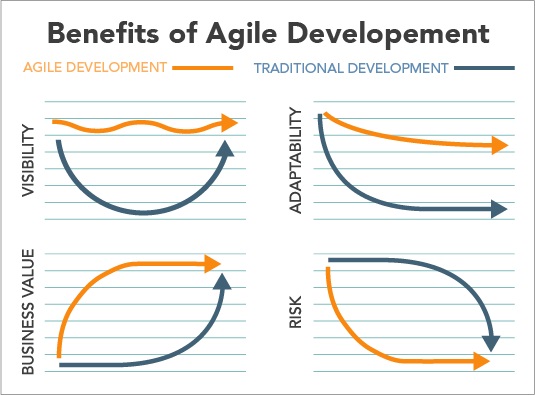The Benefits of Agile
In today’s fast-paced business environment, organizations are constantly seeking ways to improve their efficiency and productivity. One approach that has gained significant popularity is the adoption of agile methodologies. Agile is a project management and development approach that emphasizes flexibility, collaboration, and iterative progress. In this article, we will explore the numerous benefits of agile and how it can help businesses stay competitive in a rapidly changing world.
Improved Flexibility
One of the key advantages of agile is its ability to adapt to changing circumstances. Traditional project management methods often struggle to cope with unexpected changes, leading to delays and inefficiencies. Agile, on the other hand, is designed to embrace change. By breaking projects down into smaller, manageable tasks and continuously reviewing and adjusting priorities, teams can quickly respond to new requirements or market conditions. This flexibility allows businesses to stay nimble and make the necessary adjustments to deliver the best possible outcomes.
Enhanced Collaboration
Agile methodologies promote collaboration and teamwork within organizations. Instead of working in silos, team members from different disciplines come together to collaborate on a project. This cross-functional collaboration fosters better communication, idea-sharing, and problem-solving. Agile teams often hold regular meetings, such as daily stand-ups and sprint reviews, to ensure everyone is aligned and working towards the same goal. By encouraging collaboration, agile methodologies create a positive work environment that leads to higher employee satisfaction and improved project outcomes.
Increased Transparency
Transparency is a crucial aspect of agile methodologies. Agile teams maintain a clear and up-to-date project backlog, which outlines all the tasks required to complete a project. This backlog is accessible to all team members, providing transparency on project progress, priorities, and upcoming tasks. Additionally, agile methodologies often involve frequent demonstrations or showcases of completed work, allowing stakeholders to provide feedback and make necessary adjustments early on. This transparency not only builds trust among team members but also ensures that everyone is on the same page and working towards a shared vision.
Early and Continuous Delivery
Agile methodologies emphasize delivering value early and continuously throughout a project. Instead of waiting until the end to release a fully completed product or feature, agile teams aim to deliver working increments of the product at regular intervals. This approach allows businesses to gather valuable feedback from users or stakeholders early on, enabling them to make improvements or iterate based on real-world usage. By delivering incrementally, businesses can also start generating revenue or achieving business objectives sooner, giving them a competitive edge in the market.
Improved Quality
Agile methodologies promote a focus on quality throughout the development process. By breaking projects down into smaller, manageable tasks, teams can prioritize quality assurance and testing at each stage. Regular testing and feedback loops allow for early detection and resolution of issues, ensuring that the final product meets or exceeds customer expectations. Additionally, the iterative nature of agile allows for continuous improvement, with teams learning from each iteration and incorporating feedback to enhance the quality of subsequent deliverables.

Agile methodologies offer numerous benefits to businesses, ranging from improved flexibility and collaboration to increased transparency and early delivery. By embracing agile, organizations can adapt to changing circumstances, foster collaboration among team members, and deliver high-quality products or services that meet customer needs. In today’s dynamic business environment, the ability to quickly respond to market demands and deliver value is essential for staying competitive. Agile provides the framework and mindset necessary to achieve these objectives and drive success.
Frequently Asked Questions about the Benefits of Agile
1. What are the advantages of using Agile methodology?
Agile methodology offers increased flexibility, faster delivery of products, improved collaboration, and better customer satisfaction.
2. How does Agile benefit project management?
Agile project management allows for better adaptability to changes, increased transparency, improved risk management, and increased stakeholder engagement.
3. What are the benefits of Agile for software development?
Agile software development promotes regular feedback, early detection of issues, faster time-to-market, and improved product quality.
4. Can Agile help in reducing project costs?
Yes, Agile can help in reducing project costs by minimizing rework, optimizing resource allocation, and delivering value incrementally.
5. How does Agile improve team collaboration?
Agile fosters close collaboration between team members, encourages knowledge sharing, promotes self-organization, and enhances communication.
6. What are the benefits of Agile for customer satisfaction?
Agile ensures customer involvement throughout the development process, allows for frequent feedback, enables early delivery of valuable features, and increases customer satisfaction.
7. Can Agile help in managing changing requirements effectively?
Yes, Agile can effectively manage changing requirements by embracing change, providing flexibility to adapt, and prioritizing customer needs.
8. How does Agile enhance product quality?
Agile promotes continuous testing, regular inspection, and adaptation, leading to better bug detection, improved code quality, and overall higher product quality.
9. What are the benefits of Agile for team productivity?
Agile empowers teams to make decisions, encourages ownership and accountability, reduces bureaucracy, and fosters a productive work environment.
10. Can Agile benefit organizations in managing risks?
Yes, Agile can help organizations manage risks by providing early warning signs, facilitating risk mitigation strategies, and promoting a proactive approach to risk management.




